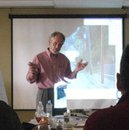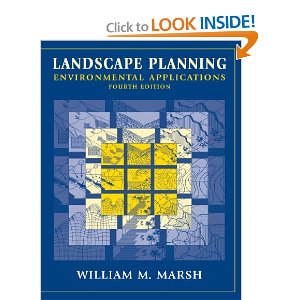Will Marsh explains “Site Adaptive Planning and Design”
Note to Reader:
The initial capital cost of infrastructure is about 20% of the life-cycle cost; the other 80% largely represents a future unfunded liability. Through a program of professional development, the regional district and three municipalities are aligning efforts and striving for a consistent Comox Valley regional approach to Sustainable Service Delivery.
The Seminar #2 spotlight was on urban watershed protection and restoration issues, with emphasis on a ‘design with nature’ approach to green infrastructure. Connecting the dots between watershed health and infrastructure type is emerging as an important piece in ‘sustainable drainage infrastructure’, both fiscally and ecologically.
The seminar was attended by the legendary Will Marsh, author of the classic textbook titled Landscape Planning: Environmental Applications. He contributed his wisdom to the town-hall sharing and learning segments of the seminar.
Site Adaptive Planning and Design
“Site adaptive planning and design is a term and approach that I  formulated some 6 or 8 years ago,” states Will Marsh. “The approach is incorporated in the new edition of Landscape Planning; I teach it regularly in my classes at UBC; and it has caught on with some landscape architects and planners, and at least one architect in the Comox Valley.”
formulated some 6 or 8 years ago,” states Will Marsh. “The approach is incorporated in the new edition of Landscape Planning; I teach it regularly in my classes at UBC; and it has caught on with some landscape architects and planners, and at least one architect in the Comox Valley.”
“This is a straight-forward planning principle that facilitates a ‘Design with Nature’ approach to development. Design with Nature was a seminal book authored by the late Ian McHarg in the 1960s. McHarg’s book deals with the importance of recognizing site, analyzing natural processes, and respecting the inherent qualities that make places special, while trying to integrate development that does not deteriorate or interrupt these values.”
“Site Adaptive Planning and Design has been developed as a process that has the ‘Design with Nature’ tenets at its core.”
To Learn More:
Click on Site Adaptive Planning and Design explained by Will Marsh to download an excerpt from one of Will Marsh’s manuscipts. — The discussion is organized in three parts. FIrst, Will Marsh describes conventional development. This provides the frame of reference for comparison with site adaptive planning and design. Will Marsh then concludes with a discussion of Smart Growth and green infrastructure.
Click on “Watersheds are not all created equal,” states Will Marsh at the second in the 2011 Comox Valley Seminar Series — First, what kind of watershed system are we in? Secondly, where are we in that system? Thirdly, how does the system function at that particular location?
About Will Marsh
Willam Marsh came to the Comox Valley from the University of Michigan where he enjoyed a diverse career as a landscape planner, teacher, author, and consultant. He is a former Chairman of the Department of Earth and Resource Sciences and a former Director of the Laboratory for Land and Water Management, both at the University of Michigan-Flint.
He has authored numerous papers on landscape planning and environmental management and is the author of several books including the classic 2005 text, Landscape Planning: Environmental Applications (4th ed) from John Wiley publishers.
UBC Connection
William Marsh is currently an Adjunct Professor in the Landscape Architecture Department at the University of British Columbia.
 Professor Marsh teaches courses and workshops in landscape analysis for site planning and design, with emphasis on small towns, coastal environments, and watersheds. He also participates in thesis committee work and advises watershed organizations, developers, and communities on problems of land use change, system-based design, and landscape management.
Professor Marsh teaches courses and workshops in landscape analysis for site planning and design, with emphasis on small towns, coastal environments, and watersheds. He also participates in thesis committee work and advises watershed organizations, developers, and communities on problems of land use change, system-based design, and landscape management.
Posted June 2011


